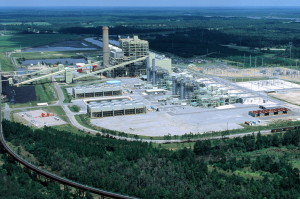New EPA regulations on coal-fired power plants could cost Mississippi billions

ON THE CHOPPING BLOCK: Coal-fired power plants like Mississippi Power’s Plant Daniel could be an endangered species under new EPA regulations proposed by the Obama administration.
By Steve Wilson | Mississippi Watchdog
The cost for Mississippi to meet proposed Environmental Protection Agency regulations governing carbon dioxide emissions from coal power plants could run into the billions.
Guess who’ll be footing the tab? Everyone who pays an electric bill.
The proposed regulations, which were released in June, would force Mississippi to reduce its carbon emissions by 38 percent in 2030 from 2005 levels under the formula, which differs for each state. Mississippi received about 13 percent of its electric generation capability from coal-fired plants in 2013 while the United States received 37 percent of its power from coal. Most of Mississippi’s electrical capacity comes from natural gas (72 percent).
Like an iceberg, the regulations on carbon emissions are the visible element. Another element of the proposed regulations that will raise rates for Mississippians is the mandate for electrical generation from renewable sources. Patrick Sullivan, president of Mississippi Energy Institute, a nonprofit dedicated to energy-based development in the state, said the renewable requirements alone could cost state ratepayers anywhere from $5 billion to $10 billion by 2030.
According to Sullivan, that cost would be added on top of the need to increase generation capacity as more industries and residents move to the state.
“When you add up the numbers on replacing these coal plants with natural gas and meeting the renewable requirements, it’s going to add up to a lot,” Sullivan said. “The administration is not talking at all about the two primary methods of carbon dioxide-free generation — nuclear and hydroelectric. All they are talking about is wind and solar. The amount of land that would be required in Mississippi for solar to meet the renewable requirement by 2030 would be staggering. You’d have to have some sort of power to back it up.”
Democrat Brandon Presley is one of the leading voices opposing the new EPA regulations on carbon dioxide emissions from coal-fired power plants. He’s the two-term Northern District commissioner of the Public Service Commission, the three-member board that regulates utilities in Mississippi and says the new regulations will put a serious crimp in the wallets of Mississippians.
NORTHERN COMMAND: Democrat Brandon Presley is the Northern District commissioner for the Mississippi Public Service Commission.
“The bottom line is any unfunded mandate from Washington, D.C. that raises electricity bills is a bad thing,” Presley said. “This would drive up the costs of Mississippians. Period. When you drive up energy costs, you hurt the business climate, the average consumer and it drives costs up on everybody. When people talk about raising taxes, I don’t see any difference between that and raising a utility bill.”
“I believe they go too far and they’re pie in the sky regulation. We need to make sure we do all we can to oppose this overreach on the part of the federal government.”
Presley joins Republican Gov. Phil Bryant, who signed a letter with eight other governors to the EPA that said cutting emissions 30 percent nationally by 2030 would kill jobs and growth.
The effects of the new regulations would be felt most in south Mississippi. Mississippi Power owns two conventional coal-fired plants — Plant Watson (1,500 megawatts) in Gulfport and Plant Daniel (1,000 megawatts) near Escatawpa — and the under-construction Kemper Project (582 megawatts) in Kemper County. South Mississippi Electric owns Plant Morrow (400 megawatt capacity) near Purvis. The three oldest plants could be shuttered under the new regulations.
The cost of building plants compliant with the new regulations could result in more bill hikes for ratepayers. The price for Kemper, which uses a coal-gasification process to turn lignite coal into synthgas to fire the plant’s turbines, is already up to $5.5 billion and the plant isn’t supposed to open until 2015.
A study by the U.S. Chamber of Commerce’s Institute for 21st Century Energy shows the new regulations could be a double-whammy for an ailing economy. According to the study, the regulations could cost the U.S. economy $50 billion and 224,000 jobs each year through 2030.
“It’s definitely going to raise rates,” Presley said. “The other thing about it is this: those dollars have been spent. The customers have paid for those plants over the years. Essentially, it’d be like buying a pickup truck, you’ve paid for it, and you decide you don’t need it and you decide to start all over. Everyone wants clean air and clear water. Everyone can agree on that. But we’ve got to go about that in a manner that makes sense.”
The EPA will take public comments before unveiling the finished regulations next year.
Get regular updates on Mississippi through our Facebook or Twitter accounts







